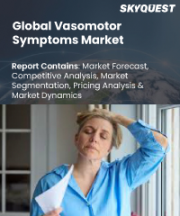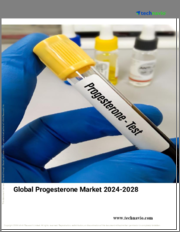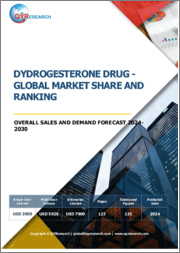
|
시장보고서
상품코드
1473817
프로게스테론 시장 규모 : 처방전별, 투여 경로별, 용도별, 약물 유형별, 유형별, 유통 채널별 예측(2024-2032년)Progesterone Market Size - By Formulation (Natural, Synthetic), Route of Administration (Injectable, Oral), Application (Contraception, Menopause), Drug Type (Generic, Branded), Type (Prescription, OTC), Distribution Channel & Forecast, 2024 - 2032 |
||||||
프로게스테론 시장 규모는 다낭성난소증후군(PCOS), 불임, 생리불순 등 호르몬 관련 질환에 대한 인식과 진단이 증가함에 따라 2024년부터 2032년까지 12.7%의 연평균 복합 성장률(CAGR)을 나타낼 것으로 추정됩니다.
WHO에 따르면, 2023년에는 가임기 여성의 약 8-13%가 PCOS에 영향을 받을 것으로 예상되며, 이 중 최대 70%가 진단되지 않은 채로 남아있을 것으로 예측됩니다. 의료 서비스 제공업체는 이 질환을 치료하기 위해 프로게스테론 약물을 처방하는 경우가 증가하고 있습니다. 인구 고령화와 갱년기 증상 증가로 인해 호르몬 대체 요법의 필요성이 더욱 커지고 있습니다.
또한, 의약품 처방 및 약물 전달 기술의 발전으로 프로게스테론 처방의 효능과 안전성 프로파일이 향상되어 임상 현장에서의 채택을 촉진하고 있습니다. 서방형 제제나 경피 패치와 같은 혁신 기술은 편리한 투여 경로를 제공하고 환자의 순응도를 향상시킵니다. 암 치료, 신경학, 정신의학 등의 분야에서 프로게스테론의 치료 가능성을 탐색하는 데 초점을 맞춘 연구 활동의 확대도 시장 성장을 가속할 것으로 보입니다.
프로게스테론 산업은 처방, 투여 경로, 용도, 약물 유형, 유형, 유형, 유통 채널 및 지역에 따라 분류됩니다.
용도별로는 피임 부문 시장 규모는 2024년부터 2032년까지 13.1%의 연평균 복합 성장률(CAGR)을 나타낼 것으로 예상됩니다. 이러한 배경에는 전 세계적으로 가족계획에 대한 관심이 높아지면서 여성들 사이에서 호르몬 피임약에 대한 인식이 개선되고 있는 것이 주요 요인으로 꼽힙니다. 프로게스테론 기반 피임약의 안전성, 유효성, 편의성을 개선하기 위한 지속적인 연구 개발 노력도 제품 제조업체와 이해관계자들에게 유리한 기회를 제공합니다.
유형별로는 OTC 부문 프로게스테론 산업은 2024-2032년 12.4%의 연평균 복합 성장률(CAGR)을 나타낼 것으로 예상됩니다. 이러한 성장은 OTC 제품에 대한 접근의 편리함과 함께 여성 건강에 대한 소비자의 인식이 높아지고 권한이 강화되면서 뒷받침되고 있습니다. 또한, 처방전이 필요 없는 프로게스테론 크림, 젤 및 보충제의 가용성은 호르몬 관련 증상을 관리하는 데 큰 자율성을 제공하여 소비자 기반을 확대합니다.
아시아태평양의 프로게스테론 산업은 2032년까지 12.3%의 성장률을 나타낼 것으로 예상되는데, 이는 인구의 급격한 증가와 더불어 PCOS 및 불임과 같은 호르몬 관련 질환에 대처하기 위한 의료 서비스에 대한 인식과 접근성이 높아졌기 때문입니다. 가족 수를 줄이고 출산을 늦추는 문화적 변화가 프로게스테론을 포함한 호르몬 피임약의 채택률 증가에 기여하고 있습니다. 또한, 인도와 중국에는 탄탄한 제약 제조 부문이 존재하기 때문에 공급망의 탄력성과 경제성을 보장하기 위해 프로게스테론 의약품의 현지 생산이 촉진되어 이 지역의 산업 성장을 가속하고 있습니다.
목차
제1장 조사 방법과 조사 범위
제2장 주요 요약
제3장 업계 인사이트
- 생태계 분석
- 업계에 대한 영향요인
- 성장 촉진요인
- 업계의 잠재적 리스크&과제
- 성장 가능성 분석
- 규제 상황
- Porter's Five Forces 분석
- PESTEL 분석
제4장 경쟁 구도
- 서론
- 기업 매트릭스 분석
- 기업 점유율 분석
- 경쟁 포지셔닝 매트릭스
- 전략 대시보드
제5장 시장 추정·예측 : 처방별, 2018년-2032년
- 주요 동향
- 천연
- 합성
제6장 시장 추정·예측 : 투여 경로별, 2018년-2032년
- 주요 동향
- 주사
- 경구
- 경피
- 기타
제7장 시장 추정·예측 : 용도별, 2018년-2032년
- 주요 동향
- 갱년기 장애
- 피임
- 기능 부전성 자궁 출혈
- 과형성 선구병변
- 자궁내막암
- 기타
제8장 시장 추정·예측 : 약제 유형별, 2018년-2032년
- 주요 동향
- 브랜드
- 제네릭
제9장 시장 추정·예측 : 유형별, 2018년-2032년
- 처방
- OTC
제10장 시장 추정·예측 : 유통 채널별, 2018년-2032년
- 주요 동향
- 병원 약국
- 소매 약국
- 온라인 약국
제11장 시장 추정·예측 : 지역별, 2018년-2032년
- 주요 동향
- 북미
- 미국
- 캐나다
- 유럽
- 독일
- 영국
- 프랑스
- 스페인
- 이탈리아
- 기타 유럽
- 아시아태평양
- 중국
- 일본
- 인도
- 호주
- 기타 아시아태평양
- 라틴아메리카
- 브라질
- 멕시코
- 기타 라틴아메리카
- 중동 및 아프리카
- 남아프리카공화국
- 사우디아라비아
- 기타 중동 및 아프리카
제12장 기업 개요
- Alkem Laboratories Ltd.
- Aquatic Group
- Bionpharma Inc.
- Cadila Pharmaceuticals
- Cipla Inc.
- Estrellas Life Sciences Private Limited.
- Eli Lily & Company
- Glenmark Pharmaceuticals Ltd.
- Insud Pharma S.L.U.
- Lupin
- Novo Nordisk A/S
- Teva Pharmaceutical Industries Ltd
Progesterone market size is estimated to witness 12.7% CAGR between 2024 and 2032, owing to increasing awareness and diagnosis of hormone-related disorders, such as polycystic ovary syndrome (PCOS), infertility, and menstrual irregularities. As per WHO, in 2023, PCOS affected an estimated 8 to 13% of reproductive-aged women, with up to 70% of the affected women remaining undiagnosed worldwide. Healthcare providers are increasingly prescribing progesterone medications to address these conditions. The aging population and rising instances of menopausal symptoms are further necessitating hormone replacement therapies.
Moreover, advancements in pharmaceutical formulations and drug delivery technologies are enhancing the efficacy and safety profile of progesterone products, fostering their adoption in clinical settings. Innovations, such as sustained-release formulations and transdermal patches offer convenient administration routes and improved patient compliance. The expanding research activities focused on exploring the therapeutic potential of progesterone in areas like cancer treatment, neurology, and psychiatry will also drive the market growth.
The progesterone industry is classified on the basis of formulation, route of administration, application, drug type, type, distribution channel, and region.
By application, the market size from the contraception segment is poised to witness 13.1% CAGR from 2024 to 2032. This is driven by the increasing global emphasis on family planning initiatives and the growing acceptance of hormonal contraceptives among women. The ongoing R&D efforts aimed at enhancing the safety, efficacy, and convenience of progesterone-based contraceptives are also offering lucrative opportunities for the product manufacturers and stakeholders.
Based on type, the progesterone industry from the OTC segment will record 12.4% CAGR during 2024-2032. The growth is favored by the increasing consumer awareness and empowerment regarding women's health, coupled with the convenience of access to OTC products. Furthermore, the availability of progesterone creams, gels, and supplements without the need for a prescription offers greater autonomy in managing hormone-related conditions, thereby expanding the consumer base.
Asia Pacific progesterone industry is slated to witness a 12.3% growth rate through 2032, attributed to the burgeoning population, coupled with increasing awareness and access to healthcare services to address hormone-related disorders, such as PCOS and infertility. The cultural shifts towards smaller family sizes and delayed childbearing are contributing to the rising adoption of hormonal contraceptives containing progesterone. Additionally, the presence of a robust pharmaceutical manufacturing sector in India and China will foster the local production of progesterone medications for ensuring supply chain resilience and affordability, stimulating the regional industry growth.
Table of Contents
Chapter 1 Methodology & Scope
- 1.1 Market scope & definition
- 1.2 Base estimates & calculations
- 1.3 Data validation
- 1.4 Forecast parameters
- 1.5 Data sources
- 1.5.1 Primary
- 1.5.2 Secondary
- 1.5.2.1 Paid sources
- 1.5.2.2 Public sources
Chapter 2 Executive Summary
- 2.1 Industry 360-degree synopsis
Chapter 3 Industry Insights
- 3.1 Industry ecosystem analysis
- 3.2 Industry impact forces
- 3.2.1 Growth drivers
- 3.2.1.1 Increasing prevalence of hormonal disorders
- 3.2.1.2 Rising awareness about women's health
- 3.2.1.3 Favorable government initiatives and healthcare policies
- 3.2.2 Industry pitfalls & challenges
- 3.2.2.1 Side effects and safety concerns
- 3.2.1 Growth drivers
- 3.3 Growth potential analysis
- 3.4 Regulatory landscape
- 3.5 Porter's analysis
- 3.5.1 Supplier power
- 3.5.2 Buyer power
- 3.5.3 Threat of new entrants
- 3.5.4 Threat of substitutes
- 3.5.5 Industry rivalry
- 3.6 PESTEL analysis
Chapter 4 Competitive Landscape, 2023
- 4.1 Introduction
- 4.2 Company matrix analysis
- 4.3 Company market share analysis
- 4.4 Competitive positioning matrix
- 4.5 Strategic dashboard
Chapter 5 Market Estimates and Forecast, By Formulation, 2018 - 2032 ($ Mn)
- 5.1 Key trends
- 5.2 Natural
- 5.3 Synthetic
Chapter 6 Market Estimates and Forecast, By Route of Administration, 2018 - 2032 ($ Mn)
- 6.1 Key trends
- 6.2 Injectable
- 6.3 Oral
- 6.4 Transdermal
- 6.5 Other routes of administration
Chapter 7 Market Estimates and Forecast, By Application, 2018 - 2032 ($ Mn)
- 7.1 Key trends
- 7.2 Menopause
- 7.3 Contraception
- 7.4 Dysfunctional uterine bleeding
- 7.5 Hyperplastic precursor lesions
- 7.6 Endometrial cancer
- 7.7 Other applications
Chapter 8 Market Estimates and Forecast, By Drug Type, 2018 - 2032 ($ Mn)
- 8.1 Key trends
- 8.2 Branded
- 8.3 Generic
Chapter 9 Market Estimates and Forecast, By Type, 2018 - 2032 ($ Mn)
- 9.1 Prescription
- 9.2 OTC
Chapter 10 Market Estimates and Forecast, By Distribution Channel, 2018 - 2032 ($ Mn)
- 10.1 Key trends
- 10.2 Hospital pharmacy
- 10.3 Retail pharmacy
- 10.4 Online pharmacy
Chapter 11 Market Estimates and Forecast, By Region, 2018 - 2032 ($ Mn)
- 11.1 Key trends
- 11.2 North America
- 11.2.1 U.S.
- 11.2.2 Canada
- 11.3 Europe
- 11.3.1 Germany
- 11.3.2 UK
- 11.3.3 France
- 11.3.4 Spain
- 11.3.5 Italy
- 11.3.6 Rest of Europe
- 11.4 Asia Pacific
- 11.4.1 China
- 11.4.2 Japan
- 11.4.3 India
- 11.4.4 Australia
- 11.4.5 Rest of Asia Pacific
- 11.5 Latin America
- 11.5.1 Brazil
- 11.5.2 Mexico
- 11.5.3 Rest of Latin America
- 11.6 Middle East and Africa
- 11.6.1 South Africa
- 11.6.2 Saudi Arabia
- 11.6.3 Rest of Middle East and Africa
Chapter 12 Company Profiles
- 12.1 Alkem Laboratories Ltd.
- 12.2 Aquatic Group
- 12.3 Bionpharma Inc.
- 12.4 Cadila Pharmaceuticals
- 12.5 Cipla Inc.
- 12.6 Estrellas Life Sciences Private Limited.
- 12.7 Eli Lily & Company
- 12.8 Glenmark Pharmaceuticals Ltd.
- 12.9 Insud Pharma S.L.U.
- 12.10 Lupin
- 12.11 Novo Nordisk A/S
- 12.12 Teva Pharmaceutical Industries Ltd



















